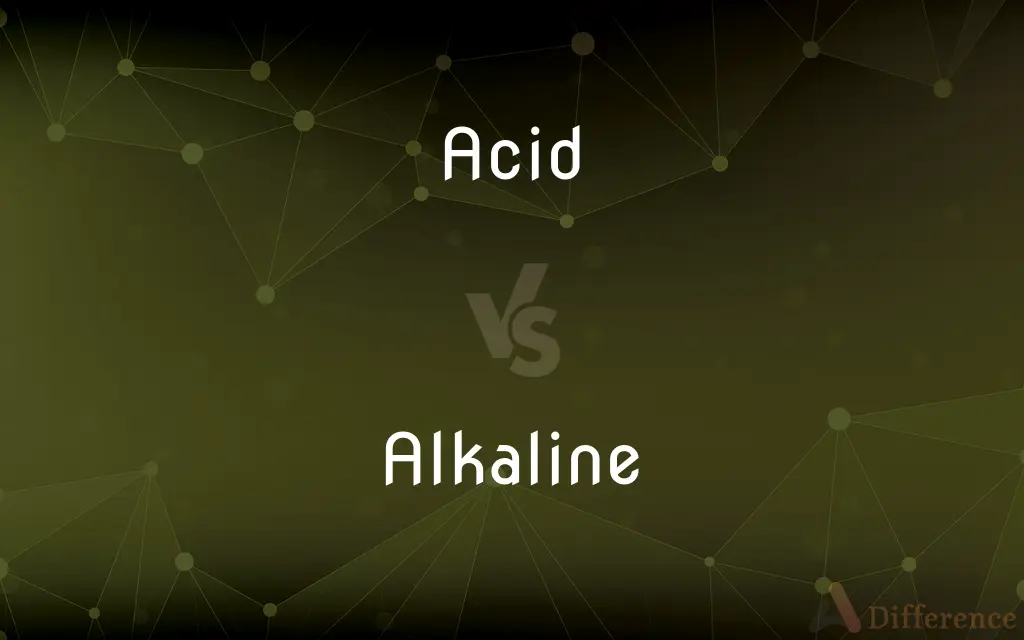Acid vs. Alkaline — What's the Difference?

Difference Between Acid and Alkaline
ADVERTISEMENT
Compare with Definitions
Acid
An acid is a molecule or ion capable of either donating a proton (i.e., hydrogen ion, H+), known as a Brønsted–Lowry acid, or, capable of forming a covalent bond with an electron pair, known as a Lewis acid.The first category of acids are the proton donors, or Brønsted–Lowry acids. In the special case of aqueous solutions, proton donors form the hydronium ion H3O+ and are known as Arrhenius acids.
Alkaline
Of, relating to, or containing an alkali.
Acid
A substance with particular chemical properties including turning litmus red, neutralizing alkalis, and dissolving some metals; typically, a corrosive or sour-tasting liquid of this kind.
Traces of acid
Trees were exposed to mixtures of heavy metals, acids, and overdoses of nutrients
Alkaline
Having a pH greater than 7.
Acid
A molecule or other species which can donate a proton or accept an electron pair in reactions.
ADVERTISEMENT
Alkaline
Having a relatively low concentration of hydrogen ions.
Acid
The drug LSD
A bad acid trip
She didn't have a clue the sweet had acid in it
Alkaline
Of or relating to a common disposable battery made of zinc and manganese dioxide.
Acid
Containing acid or having the properties of an acid; having a pH of less than 7.
Acid soils
Alkaline
Of, or relating to an alkali, one of a class of caustic bases.
Acid
Sharp-tasting or sour
Acid fruit
Alkaline
(chemistry) Having a pH greater than 7.
Acid
(of rock, especially lava) containing a relatively high proportion of silica
The magma may start off fairly basic and end up at the close of the eruption much more acid
Alkaline
An alkaline battery.
Acid
Any of a class of substances whose aqueous solutions are characterized by a sour taste, the ability to turn blue litmus red, and the ability to react with bases and certain metals to form salts.
Alkaline
Of or pertaining to an alkali or to alkalies; having the properties of an alkali.
Acid
A substance that yields hydrogen ions when dissolved in water.
Alkaline
Relating to or containing an alkali; having a pH greater than 7;
Alkaline soils derived from chalk or limestone
Acid
A substance that can act as a proton donor.
Acid
A substance that can accept a pair of electrons to form a covalent bond.
Acid
A substance having a sour taste.
Acid
The quality of being sarcastic, bitter, or scornful
Wrote with acid about her first marriage.
Acid
(Slang) See LSD1.
Acid
Of, relating to, or containing an acid.
Acid
Having a high concentration of acid.
Acid
Having the characteristics of an acid.
Acid
Having a pH of less than 7.
Acid
Having a relatively high concentration of hydrogen ions.
Acid
(Geology) Containing a large proportion of silica
Acid rocks.
Acid
Having a sour taste.
Acid
Biting, sarcastic, or scornful
An acid wit.
An acid tone of voice.
Acid
Sour, sharp, or biting to the taste; tart; having the taste of vinegar.
Acid fruits or liquors
Acid
(figuratively) Sour-tempered.
Acid
Of or pertaining to an acid; acidic.
Acid
(music) Denoting a musical genre that is a distortion (as if hallucinogenic) of an existing genre, as in acid house, acid jazz, acid rock.
Acid
A sour substance.
Acid
(chemistry)
Acid
Any compound which yields H+ ions (protons) when dissolved in water; an Arrhenius acid.
Acid
Any compound that easily donates protons to a base; a Brønsted acid.
Acid
Any compound that can accept a pair of electrons to form a covalent bond; a Lewis acid.
Acid
Any corrosive substance.
Acid
LSD, lysergic acid diethylamide.
Acid
Sour, sharp, or biting to the taste; tart; having the taste of vinegar: as, acid fruits or liquors. Also fig.: Sour-tempered.
He was stern and his face as acid as ever.
Acid
Of or pertaining to an acid; as, acid reaction.
Acid
A sour substance.
Acid
One of a class of compounds, generally but not always distinguished by their sour taste, solubility in water, and reddening of vegetable blue or violet colors. They are also characterized by the power of destroying the distinctive properties of alkalies or bases, combining with them to form salts, at the same time losing their own peculiar properties. They all contain hydrogen, united with a more negative element or radical, either alone, or more generally with oxygen, and take their names from this negative element or radical. Those which contain no oxygen are sometimes called hydracids in distinction from the others which are called oxygen acids or oxacids.
Acid
Any of various water-soluble compounds having a sour taste and capable of turning litmus red and reacting with a base to form a salt
Acid
Street name for lysergic acid diethylamide
Acid
Harsh or corrosive in tone;
An acerbic tone piercing otherwise flowery prose
A barrage of acid comments
Her acrid remarks make her many enemies
Bitter words
Blistering criticism
Caustic jokes about political assassination, talk-show hosts and medical ethics
A sulfurous denunciation
Acid
Containing acid;
An acid taste
Share Your Discovery

Previous Comparison
Llama vs. Alpaca
Next Comparison
Love vs. Friendship













































